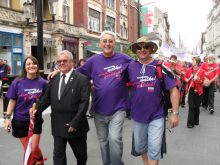 In an interview with my Recovery Voices colleague Wulf Livingston, he talks about his early hedonistic drug and alcohol use, life as a successful chef, and qualification as a social worker. He then worked with the drug and alcohol charity Lifeline, the drug treatment charity CAIS in North Wales, and the Probation Service.
In an interview with my Recovery Voices colleague Wulf Livingston, he talks about his early hedonistic drug and alcohol use, life as a successful chef, and qualification as a social worker. He then worked with the drug and alcohol charity Lifeline, the drug treatment charity CAIS in North Wales, and the Probation Service.
Wulf later joined academia, eventually becoming Professor of Alcohol Studies at Glyndwr University in Wrexham. He believes what really makes a difference to people’s lives is what occurs beyond the addiction treatment phase.
I am enthralled by Wulf’s passion for social justice, his knowledge about what is needed to help more people recover from addiction, and his commitment to helping create positive societal change. The interview was edited into 16 short films, totally just under 80 minutes. Here is one of those films:



 In my
In my 

